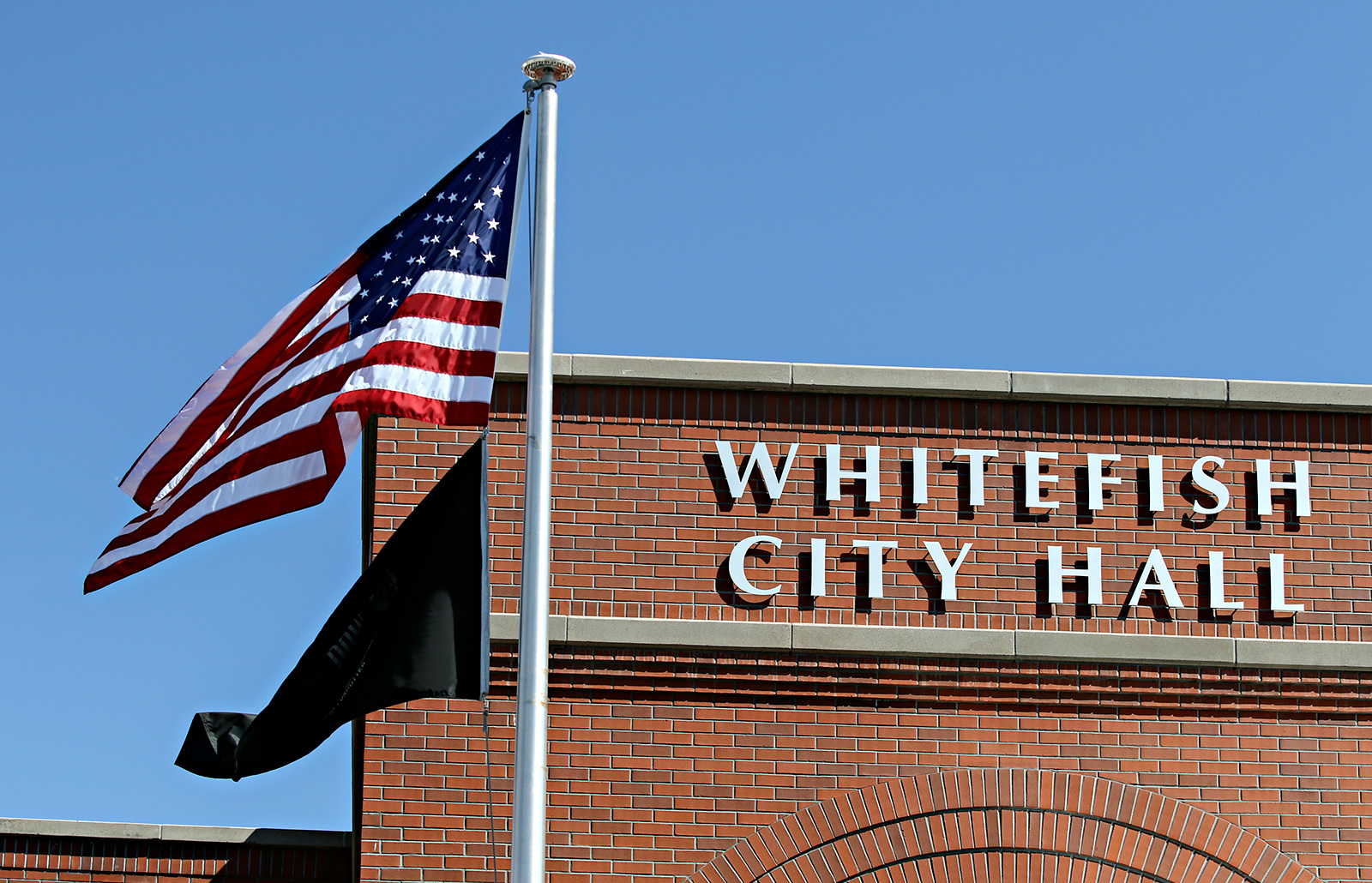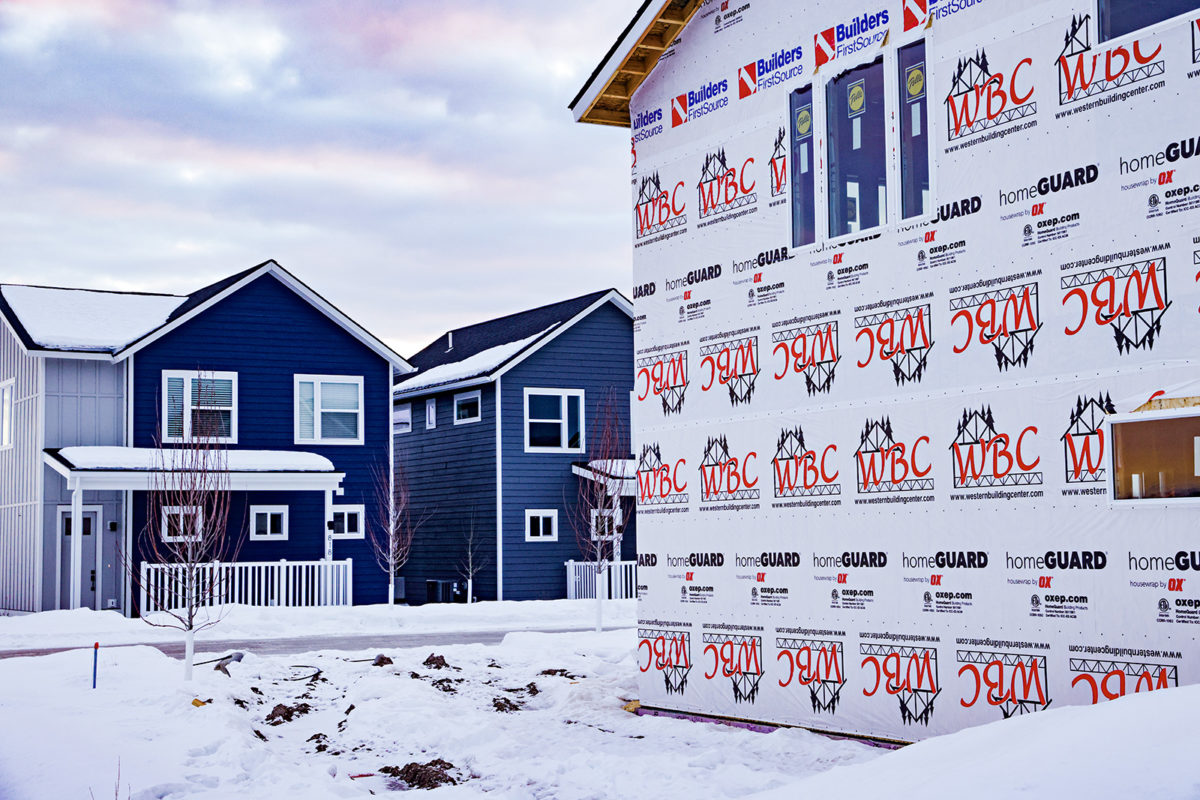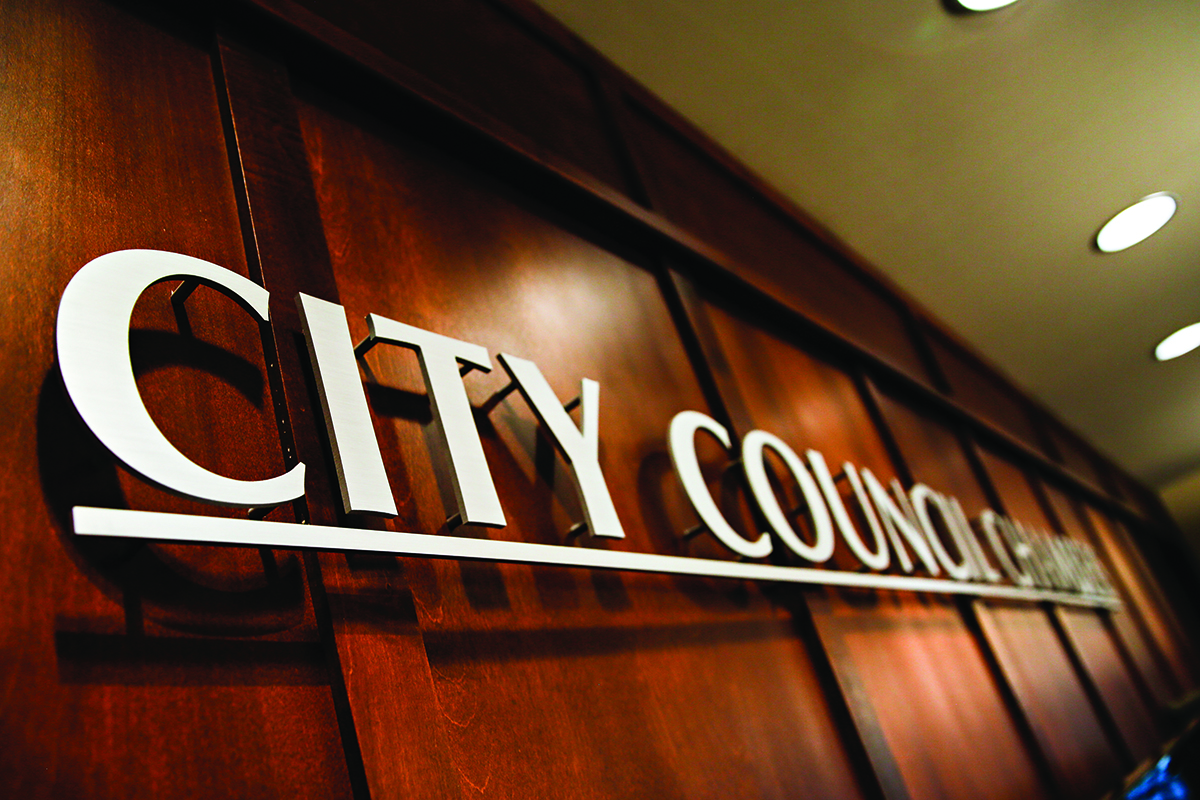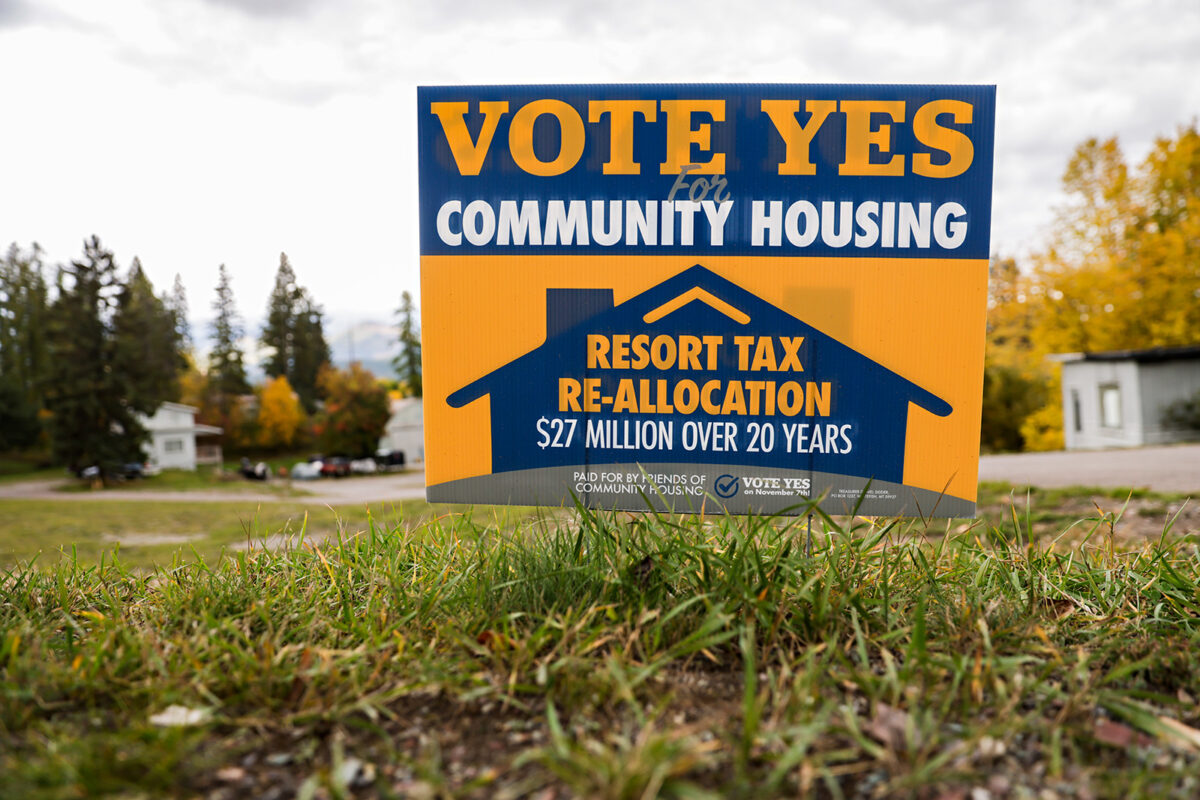As Whitefish Grapples with Growth and Housing, 7 Candidates Vie for 3 Seats on City Council
Voters are also being asked to decide if they support reallocating a portion of the city’s resort tax to go towards funding community housing programs
By Mike Kordenbrock
As elected officials in Whitefish continue to grapple with the effects of growth, change, and the town’s ongoing housing crisis, seven people are running for three seats on the Whitefish City Council.
Among the candidates are three incumbents seeking to retain their seats, including two who are looking to be reelected for second terms. All seven candidates attended two recent events, which consisted of a debate and candidate forum at the Montana Tap House in late September, and a candidate forum at Depot Park hosted by the Whitefish Pilot and the Whitefish Chamber of Commerce earlier in October.
The longest serving incumbent seeking reelection is Frank Sweeney, who has served on the council for three terms, including two as deputy mayor. Sweeney has been in Whitefish since the early 2000s when he moved to the area and opened a law practice.
At the two events, Sweeney touted the council’s “progressive” measures and “incredibly successful” track record. He identified the city’s growth policy rewrite, affordable housing initiatives and the health of Whitefish Lake as important issues the council will face in the next four years.
Sweeney said that he was initially drawn to the job by the city’s willingness to listen to the concerns of residents.
“We have a habit, some think it’s a fault, of listening to each and every person who has a concern. We try not to cut them off, we try to allow them to articulate. We don’t try to embarrass them or pressure them,” Sweeney said at the Tap House.
Rebecca Norton has served on the council for four years, and prior to that spent four years on the city’s planning board, two years on the board of adjustment, and was also on the city’s local government review commission. Norton is a retired occupational therapist and hand therapy practitioner who moved to Whitefish in 1996.
At the Tap House event, Norton said it’s been an honor serving on the council and praised the people she has worked alongside.
“I would like to serve another four years, mostly because I really respect the people I’ve served with, and I love our staff,” Norton said. “I think the staff doesn’t get nearly as much credit as they should.”
She also said she was happy with the city’s efforts to address housing, but said the city is also “way behind” on the issue, and that dealing with the Montana Department of Transportation on traffic-related issues will be essential in the coming years. Norton’s time on the government review commission came up at the Tap House when she was asked about her support for paying members of the city council, which is currently a volunteer position. She said compensation for the public service won’t make anyone rich, but that she viewed it as incentive to encourage younger people and women with children, as well as people who are not independently wealthy, to consider running.
“I know we can afford it. I do think, at this point in time, if we put it on the ballot, it would pass,” Norton said.
Steve Qunell has been on the council for four years, and also sits on the city’s planning board as its chair. A teacher, Qunell moved to the area in 2000, and said he began volunteering for the city as a member of the planning board around 2005.
“We have a lot of unfinished work to do with regards to housing,” Qunell said at the Tap House event. He also emphasized how important experience is for people who want to serve on the council, and described how an understanding of the process, as well as an understanding of the city’s past, and its future, are important qualities.

During the debate, Qunell was asked about casting the lone vote in February 2022 in favor of the Mountain Gateway development at the base of Big Mountain Road, which could have brought 318 units of housing, including 32 deed-restricted units, to Whitefish, as well as land donations for the development of affordable housing and a fire station. At the time, Qunell had explained his vote by saying that the council was disregarding the findings of city staff, and that voting against the development would be sending a message that “Whitefish is closed to the working class.”
“There was a group that formed rather quickly and raised a ton of money to oppose the project. And they put out a survey that was flawed, but they used that, and people continually reference that survey that was biased against the project,” Qunell said at the Tap House forum. “I came up with a different conclusion than my constituents did. And I think that’s part of being a leader, is weighing the facts and making unpopular decisions.”
The four candidates seeking their first term on the city council are Nathan Dugan, Nancy Schuber, Kent Taylor, and Jim Ramlow.
Dugan is a physical therapist and MBA student at the University of Montana who has become a vocal advocate for housing and housing policy reform in Whitefish and has lived in Whitefish since 2015. The founder and president of the nonprofit Shelter WF, a group which seeks to confront housing inequality in Whitefish, Dugan also serves as an appointee on Gov. Greg Gianforte’s Housing Task Force, which was responsible for generating some of the ideas behind the housing reforms passed during the recent legislative session. Dugan largely stood by those bills at the debate, describing them generally as having bipartisan support, and saying that they took the low-hanging fruit off the table so that more creative, impactful housing solutions can be implemented.
In his opening remarks at the Tap House debate, Dugan said that his campaign is about ensuring Whitefish remains a “welcoming, friendly, and socio-economically diverse community into the future,” and connected the city’s housing problems to its traffic problems, noting that 57% of the city’s workforce drives into town, which adds thousands of vehicles to city streets.
Dugan said he’s “a doer,” and pointed to his follow-through and progress on trying to move the needle and change the conversation in Whitefish around housing, and that he’s seen the council being to address housing issues with more rapidity.
“But there’s still a lot of progress to be made,” he said. “We’re entering into a very important growth planning phase right now, that’s going to affect how our town develops into the next 20 years.”

Schuber, a retired personal trainer at The Wave, who is also an instructor with the nonprofit DREAM Adaptive, says she is running in part because the council needs more representation from women. Schuber has been critical of tourism, and was the only candidate at the Whitefish Pilot forum to say they believe the negatives of tourism outweigh the benefits.
“Bringing in millionaires and billionaires, that are buying second and third homes, that don’t contribute to resort tax but once a year, and take housing away from workforce people is a negative,” Schuber said. “We’ve been found out. It’s not a secret anymore. They’re still coming. They’re going to continue to come. We’re now spending a lot of money on trying to manage them. I think sustainable tourism is an oxymoron.”
Schuber has also questioned the Whitefish Community Sustainability Fund (CSF), something that she and another candidate, Kent Taylor, debated at the Tap House event.
The CSF is funded by a 1% fee on bills at participating lodging, dining and transportation businesses in Whitefish, and goes towards funding a variety of programs, including the nonprofit Housing Whitefish, the “Be A Friend of the Fish” campaign, grants for participating members and nonprofits, and the city’s Sustainable Tourism Management Plan. She said she was opposed to what she sees as “a lack of transparency” surrounding the CSF.
In her closing remarks at the Tap House, Schuber emphasized that the council needs more women.
“And I stepped up. I don’t think a lot of other women have stepped up, so that’s the reason I’m running,” Schuber said.
Taylor is the owner of the Hidden Moose Lodge and a Whitefish resident of more than 30 years. He said he was motivated to enter into the race because of Schuber’s position on the CSF, something he described as a part of how the Whitefish Convention and Visitors Bureau gives back to the community and supports local businesses.
“The reason I’m running is that I see some of the charm and character, and some of the core values of our community under attack, and that alarmed me and inspired me to throw my name in the ring,” Taylor said.
At the Whitefish Pilot forum, Taylor also defended the businesses that rely on tourism, saying that those businesses help bring in revenue for the resort tax.
“I think the majority of people probably agree the resort tax has been a major, significant, huge accomplishment, and if you don’t take care of that tourist part of that it’s going to wither and die,” Taylor said
Taylor, who opposed the Mountain Gateway development, said at the Tap House that while he disagreed with Qunell’s vote, he applauded him for voting the way he did, and described it as a moment that represented the need for differing opinions on the council.
“To me, it was a money grab,” Taylor said of the developers, who proposed a similar project in Columbia Falls. “And they tried it again in Columbia Falls, and they voted it down.”

Taylor also suggested new regulations for short-term rentals, like the requirement that someone live on the property, as one way to help the city’s housing problems.
In the view of Whitefish attorney Jim Ramlow, who is also running for city council, the city does not have the authority to regulate length of tenancy, including with short-term rentals, based on his interpretation of the Montana Residential Landlord Tenant Act. Ramlow characterized his stance as something grounded in the law, but he was criticized by Qunell at the Tap House debate for representing a client who wants short-term rentals allowed on his property, which Qunell said could open the door to allowing those rentals elsewhere in the city.
“It’s a serious question about whether the city of Whitefish will act according to the law or not,” Ramlow said in response.
Ramlow specializes in tax, estate planning, trust and probate law, commercial transactions and adoptions, and was born in Whitefish. He has advocated for free market solutions to the city’s housing problems, and has emphasized his ability to render careful consideration of the legality of decisions by the city.
Ramlow said he hopes to continue to make Whitefish a friendly, pleasant place for people to live regardless of their income category.
“I have a different perspective on how to go about that, from what I’ve seen expressed in City Council policies,” he said. “I’d like to add a free market voice to the planning process that goes on.”
One of the more significant tasks the council will undertake in the next four years is the city’s rewrite of its Growth Policy. A document that is supposed to guide the city’s growth and development in anticipation of the next 20 years, the Growth Policy is something that city staff, developers, and city councilors turn to in evaluating developments and other construction projects, and the document is likely to take on even greater importance as a result of Senate Bill 382.
That law, which was passed during the previous legislative session, has been interpreted as emphasizing public participation in the growth policy process, and then minimizing opportunities for public comment by tasking city staff with approving or denying developments based on the updated growth policy.
In the context of the growth policy rewrite, candidates offered up a mix of responses at the Pilot forum when asked what they think the city will look like in 20 years, and where and how it should grow.
Norton focused her response on her vision for clean water, healthy trees, and transportation oriented around shared-use paths, and the need to manage climate warming.
For Taylor, the city would ideally look like it did 10 years ago, and he shared his hope that the city can maintain its charm and character while growing outside of the downtown core.
Ramlow said that he cares about the town’s appearance, and wants to preserve it, but that the city is missing the broader economic base it could rely on in years past when the timber industry, railroad, and aluminum plant were keeping more people employed.
“I don’t know if Whitefish’s future can really stand up on one leg of being a resort and tourist town,” Ramlow said. “Tourist towns repeatedly struggle with the issues we’ve been seeing with the diversity of economic ability — some people can afford to live here, some people can’t. I would like to work on re-diversifying Whitefish’s economy so ordinary people can get real jobs with real retirement plans and have a chance to make it here.”
Schuber started by describing her desire to keep Whitefish Lake pristine. From there, she described wanting a bus system running between Columbia Falls, Kalispell and Whitefish to bring workers into town without cars, before going on to describe road and traffic improvements she’d like to see, including another viaduct crossing that she said would offer a safe exit for people in the event of a wildfire.
Dugan detailed how he would like to see the city minimize urban sprawl so that open areas and agricultural land can be maintained “as long as we can,” and to see development spread out more evenly.
“I want more neighborhoods to be like my neighborhood that’s full of full-time residents. We all know each other, and have block parties and have dinners at each others’ houses. You can’t have that without having a lot of full-time residents here. Forty percent of our homes are owned as second homes, and that’s a problem. We need to increase the number of people that are living here full time,” Dugan said.
Qunell, in his response, emphasized that the growth policy is not about what he wants Whitefish to look like in 20 years, but what the community’s vision is.
“I think that’s a really important piece of what we have to think about. It’s not just what city councilors want, but what all of our community members want, and to be able to listen to each other and do it in a respectful way,” he said.
He added that he thinks it’s a problem that the city constantly looks outside city limits for growth, and that he thinks the attention should start to be focused on areas identified within city limits that are underdeveloped, and that those efforts would help with the city’s climate action plan and make the city more walkable.
“Once again, I have to say I agree with Steve,” Frank Sweeney said, in beginning his answer. He talked about how when he and his wife moved to Whitefish they didn’t want to change the community, but become a part of it.
“Yes, we have less economic drivers than we may have had 15 or 20 years ago or 30 years ago, and I think we need to work on that, but my vision for this place is what we want this place to be. We, as a community,” Sweeney said, adding that his vision for the future would include more workforce housing and more full-time residents.

Resort Tax Reallocation
Also on the ballot this November is a question asking if voters support reallocating 10% of the city’s resort tax to support funding community housing, which could generate $27 million in funding for housing over a 20-year period. The city council voted by a 6-0 margin over the summer to add the question to ballots.
The resort tax is a 3% fee collected in Whitefish on transactions related to lodging, retail, bars, and restaurants.
The reallocation would take 10% of the money freed up by the 2025 completion of paying off the Haskill Basin Conservation Easement Bond, and divert it toward community housing, which could include funding for projects, as well as measures like a workforce rental assistance fund, and a homebuyer assistance program to help residents get into deed-restricted homes through down-payment assistance. If the reallocation is approved, the city council will vote to determine how, specifically, the money is used.
Previously, voters approved reallocating a portion of that money so that 58% of the resort tax would go to the cost of street repairs and utilities projects. Currently, 43.34% of that money is set aside for street repairs and utilities. If the new reallocation plan is approved, street repairs would see a 5% increase in funding, as opposed to the previously approved 15%.
The reallocation is not a resort tax collection increase, and, as proposed, would not affect the 25% portion of resort tax revenues earmarked for property tax relief, nor would it affect the 5% reserved to offset the costs merchants take on to administer the fee.
At the Pilot’s candidate forum, Mayor John Muhlfeld, who is running unopposed for reelection, urged attendees to vote in favor of the reallocation, and described it as something that would help the city address its issues with workforce housing and affordable housing.
“We need to help our businesses, we need to help those that want to continue to live and work here, and not send our workers to other places like Columbia Falls and Kalispell who are certainly seeing similar trends with their housing prices,” Muhlfeld said. “So let’s step it up, let’s get it done like we always do as a community, and vote yes on the resort tax initative come November.”
Whitefish Chamber of Commerce Executive Director Kevin Gartland also said at the event that the chamber endorses the reallocation, and the reallocation is also supported by the nonprofit Housing Whitefish, which works with the city’s housing authority.
“Honestly, I’d love to see council and the city have a process that’s open and transparent, where we’re having people be able to apply for those funds, and make it competitive so that we’re getting the best projects and programs,” Housing Whitefish’s Executive Director Daniel Sidder said at the Pilot forum. “While Housing Whitefish, I’d love for us to be first in line, I want the best programs, the best projects, to really come forward.”
The candidates at the forum were also asked where they come down on the reallocation, and all seven said they supported it.
Municipal elections will be held Tuesday, Nov. 7. The Flathead County Election Department mailed absentee ballots on Oct. 23. To register to vote in this city council election, find your polling place and for general information about the 2023 election, visit www.flathead.mt.gov/election.